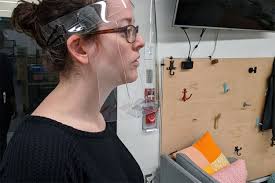Can a Face Shield Protect My Eyes from Coronavirus/Covid 19? by Marc Grossman, O.D.
 Many of us wear a mask to reduce the spread of COVID-19, but could eye protection such as a face shield also help? Science is close to proving connections between coronavirus SARS-CoV-2 and the eye. When may it be helpful to shield the eyes?
Many of us wear a mask to reduce the spread of COVID-19, but could eye protection such as a face shield also help? Science is close to proving connections between coronavirus SARS-CoV-2 and the eye. When may it be helpful to shield the eyes?
The Eyes and the Coronavirus
Other viruses are known to infect the tissues covering the whites of the eye and inside the eyelid – the conjunctiva. Most of the conjunctiva is exposed to the air, and thus vulnerable to viral attack. Some COVID-19 patients have SARS-CoV-2 infections in the eyes. The virus may have entered the body through this conjunctivitis. To attack the eye, the virus needs to attach to certain types of cells. A small study, currently under peer review, found that a healthy eye’s surface cells contain key factors that SARS-CoV-2 needs to carry out an attack.
Tears can be a way of spreading COVID-19, too. The coronavirus has been detected in the tears of some patients. Rub the eyes, touch someone’s hand, they touch their eyes, mouth, or hand-held food . . . and the cycle continues.
Shielding the Eyes – Workers
Doctors, dentists, and other health care workers have been using face shields, goggles, and eye shields for some years. The viruses that cause AIDS and hepatitis spurred on innovations in Personal Protective Equipment (PPE). Close contact with potentially infected patients and body fluids is a good reason to take all precautions.
Workers who have close contact with the public may consider shielding the eyes. If the worker is behind a plexiglass shield at a checkout counter, for example, their eyes are already partly protected from customer droplets. Workers who have conversations with the public at fewer than 6 feet away may want to shield their eyes in addition to covering their noses and mouths.
How Senior Citizens Can Reduce Exposure
The average senior citizen is at the highest risk for severe illness, long-term complications, and premature death from COVID-19. Age alone, even without pre-existing conditions, is considered a risk factor. Therefore, follow these general guidelines to avoid COVID-19:
- Stay home as much as possible
- Stay 6 feet away from others when possible
- If you are near people outside the home, wear a face covering over the mouth and nose
- Avoid indoor events – outdoors is better
- Avoid large crowds
- Do not touch your face or rub your eyes
- Wash hands with soap for 20 seconds
- Use hand sanitizer
Eye protection should not be needed for most seniors, most of the time. However, if you must spend more than a few minutes in an enclosed space such as an airplane, office, or public transport vehicle, consider adding eye shielding. A face mask over the eyes and mouth is crucial. If you can add a face shield, eye shield, or goggles, consider it.
Anyone who wears prescription glasses or sunglasses automatically has some protection against respiratory droplets. However, do not count on your glasses for total eye protection.
Face shields are available online, including on Amazon. They are clear plastic shields that cover from the forehead down, past the chin. Sanitize and reuse a shield hundreds of times. An elastic strap around the head holds the shield in place. Some can be attached to hats for comfort. Large-scale studies on face shields have not yet been conducted (June 2020). But simulation studies have shown that in a medical setting, they sharply reduce immediate viral exposure.
Stay Strong
Make healthy choices to help your body fight off disease.
- Eat plenty of fruits and vegetables
- Eat less fatty food, sugary foods, and junk food. They lower immunity.
- Reduce stress
- Exercise regularly
Research has shown that immune system benefits from certain nutrients. The most important nutrients are vitamin D, vitamin C, vitamin E, vitamin A, and folate/folic acid, iron, selenium, and zinc.
For more information on immune building and virus protection, visit www.naturaleyecare.com
Photo credit: www.mit.edu
 Marc Grossman, Doctor of Optometry and New York State Licensed Acupuncturist is author of several books, including Natural Eye Care – Your Guide to Healthy Vision. Since 1980 Dr. Marc Grossman has helped many people maintain healthy vision and even improve eyesight. He is best described as a Holistic Eye Doctor, dedicated to helping people with such conditions ranging from myopia and dry eyes to potentially vision threatening diseases as macular degeneration and glaucoma. His combined multi-disciplinary approach using nutrition, eye exercises, lifestyle changes and Chinese Medicine provides him with a wide array of tools and approaches to tackle difficult eye problems. Dr. Grossman founded the Rye Learning Center in 1980, a multidisciplinary center for learning problems, in 1996 co-founded Integral Health Associates in New Paltz, New York, and in 1999 co-founded Natural Eye Care, Inc. For more information go to www.naturaleyecare.com or call 845-255-3728.
Marc Grossman, Doctor of Optometry and New York State Licensed Acupuncturist is author of several books, including Natural Eye Care – Your Guide to Healthy Vision. Since 1980 Dr. Marc Grossman has helped many people maintain healthy vision and even improve eyesight. He is best described as a Holistic Eye Doctor, dedicated to helping people with such conditions ranging from myopia and dry eyes to potentially vision threatening diseases as macular degeneration and glaucoma. His combined multi-disciplinary approach using nutrition, eye exercises, lifestyle changes and Chinese Medicine provides him with a wide array of tools and approaches to tackle difficult eye problems. Dr. Grossman founded the Rye Learning Center in 1980, a multidisciplinary center for learning problems, in 1996 co-founded Integral Health Associates in New Paltz, New York, and in 1999 co-founded Natural Eye Care, Inc. For more information go to www.naturaleyecare.com or call 845-255-3728.
